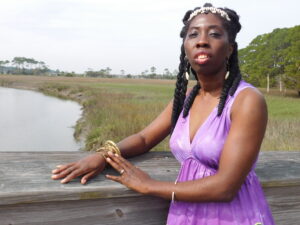Apply now to join our next cohort of Community Science Fellows and Community Leads!

This project is being coordinated by Queen Quet, Chieftess of the Gullah/Geechee Nation as part of the “Greening Gullah/Geechee Communities” initiative to build community capacity for and to resource green infrastructure in the Gullah/Geechee Nation as a tool of climate action. The Gullah/Geechee Sustainability Plan not only seeks to protect the environment, but to also protect the human and environmental healthy in the southeast so that Gullah/Geechee culture will continue to thrive as will the earth.
Thriving Earth Exchange is supporting Gullah/Geechee community capacity building by providing support for native Gullah/Geechees to participate in the annual Coastal Cultures Conference with the scientists and environmentalists of the Gullah/Geechee Sustainability Think Tank. The native Gullah/Geechee citizens will be able to increase their understanding of a variety of scientific concepts that are part of the discussion of climate change including ocean acidification. They will learn conservation and resilience practices that can help sustain the health of the ocean. Having this information combined with Gullah/Geechee traditional knowledge will allow the Gullah/Geechee Nation to not only hold on to cultural heritage practices, but help with sustaining food security.
St. Helena Island in Beaufort County, SC is a rural Sea Island with a predominantly Gullah/Geechee population that is still reliant upon the waters that surround the island for subsistence. The Gullah/Geechee people are a unique national ethnic group that lives along the Intercoastal Waterway of the southeast. There are approximately 1 million people of Gullah/Geechee ancestry located between Jacksonville, NC and Jacksonville, FL on the Sea Island chain and within what is referred to as the “Carolina Lowcountry.” St. Helena Island, SC which is one of the largest Sea Islands, has one of the largest contiguous Gullah/Geechee communities that still practice the traditions of their ancestors. Approximately 10,000 people inhabit St. Helena Island off the coast of Beaufort, SC. The island is considered by many to be the epicenter of Gullah/Geechee life both historically and in the present day. St. Helena Island has a Cultural Protection Overlay (CPO) District that is part of the zoning plan for Beaufort County. The CPO was put in place specifically to protect Gullah/Geechee culture.
The isolation of the Sea Islands, which continued until the early 20th century, allowed Gullah/Geechee descendants to maintain many of their African traditions. It also allowed this group to develop as a distinct community with its own language and culture (US NPS 2011). For more than a century, the Gullah/Geechee have lived in balance and harmony with the land and waterways as a natural continuum of their African and indigenous American traditions passed down by their ancestors. That balance has been disrupted, however, as urban sprawl spreads across the region, consuming natural habitats, intensifying land uses, and proliferating impervious surfaces that increase stormwater runoff.
This is the second project from the Gullah/Geechee, you can view previous activities here: https://thrivingearthexchange.org/project/st-helena-island-sc
The intention is to have a “Gullah/Geechee Environmental Education” event to engage an intergenerational group of native Gullah/Geechees here on St. Helena Island (www.SaintHelenaGullahGeechee.com) in order to build community capacity around green infrastructure. Queen Quet seeks to educate Gullah/Geechee families on how to do landscape architecture using native plants that can absorb water, cleanse out toxins, and protect the coastline. They will also learn more about the term “living shorelines” and the benefits of these as they relate to protection from flooding and the maintenance of biodiversity in our estuaries.
Gullah/Geechee community members will receive training and equipment to test water quality and attend the Coastal Cultures Conference.
The Coastal Cultures Conference and Water Quality and Coastal Resiliency engagements will take place on April 8th and 9th 2022.

Queen Quet was selected, elected, and enstooled by her people to be the first Queen Mother, “head pun de bodee,” an official spokesperson for the Gullah/Geechee Nation. As a result, she is respectfully referred to as “Queen Quet, Chieftess and Head-of-State for the Gullah/Geechee Nation.” Queen Quet is a published author, computer scientist, lecturer, mathematician, historian, columnist, preservationist, environmental justice advocate, environmentalist, film consultant, and “The Art-ivist.” She is the founder of the premier advocacy organization for the continuation of Gullah/Geechee culture, the Gullah/Geechee Sea Island Coalition. Read more about Queen Quet here.

Tiffany Mouzon is Program Coordinator for the Marshall-Motley Scholars Program at NAACP Legal Defense and Educational Fund, Inc (“LDF”). Tiffany received her law degree from the University of the District of Columbia: David A. Clarke School of Law, and a B.A. in Economics from Emory University School of Law. During law school, she was an Equal Justice Rights Summer Fellow and a founding member of the Black Men’s Law Society. Between college and law school, Tiffany served in Suriname, South America with the Peace Corps, worked as a legal support professional, and nonprofit operational administrator. Prior to joining Cadence Counsel and Bridgeline Solutions, she worked as a nonprofit/community organizations consultant. In her free time, Tiffany enjoys spending time with her family and friends, and working in her community as a racial justice and disability rights advocate. She is a native Gullah/Geechee and an active member of the Gullah/Geechee Nation and the Gullah/Geechee Sustainability Think Tank.
(c) 2024 Thriving Earth Exchange